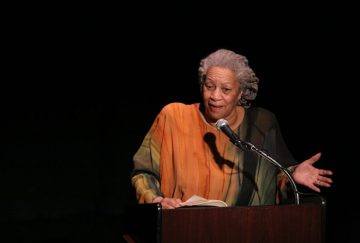 Joy James in Boston Review:
Joy James in Boston Review:
Released only weeks before the author’s death on August 5, Toni Morrison: The Pieces I Am opens with artist Mickalene Thomas making a collage of an elderly Morrison superimposed upon an image of her as a young woman, embellished with flowers and patterned fabrics. The force of black art dominates the documentary—not only Morrison’s own words, but images from twenty-one prominent black artists including Kara Walker and Faith Ringgold, all shown atop a lush score composed by Kathryn Bostic. The emotional richness of the film skillfully pulls viewers into the unique power of Morrison’s fiction. However, its nearly exclusive focus on her novels—and its progressive liberal depiction of Morrison as a singular genius—sidelines Morrison’s political impact as an editor and essayist, creating a strangely lopsided impression of her life and impact.
In the late sixties and early seventies, before she was known as an author, Morrison was a Random House trade editor who almost singlehandedly introduced black radical activists to mainstream American readers. No single editor or major publishing house has surpassed Morrison’s contribution in the intervening four decades. Cofounder of the Black Panther Party Huey P. Newton (To Die for the People, 1972); prison activist and Black Panther field marshal George Jackson (Blood in My Eye, 1971); and Angela Davis (Angela Davis: An Autobiography, 1974) were all published by Morrison at Random House. Morrison did not necessarily embrace these ideologies, but believed it was invaluable that they circulate in the marketplace of ideas—despite their demonization by the U.S. government.
More here.
